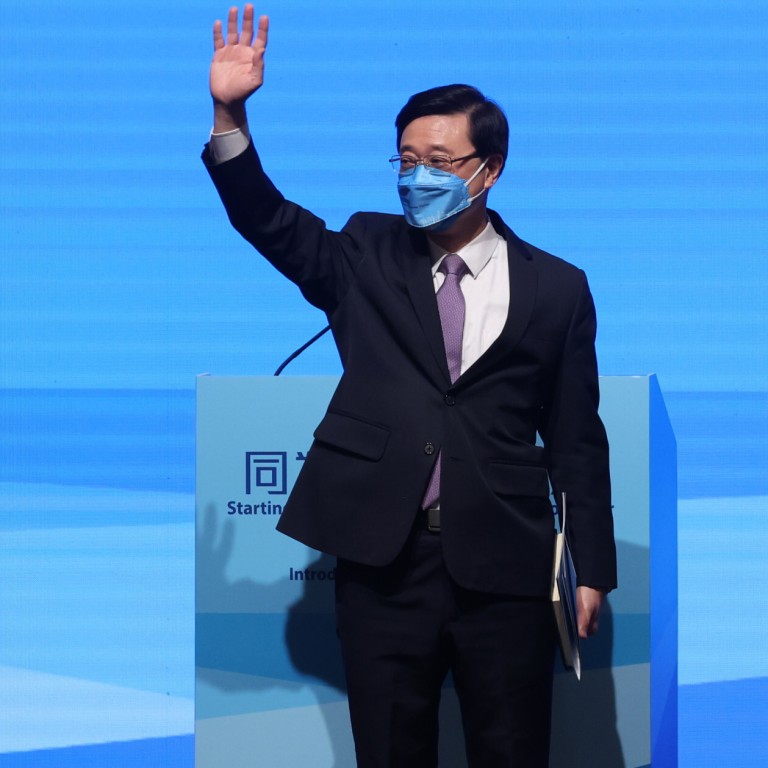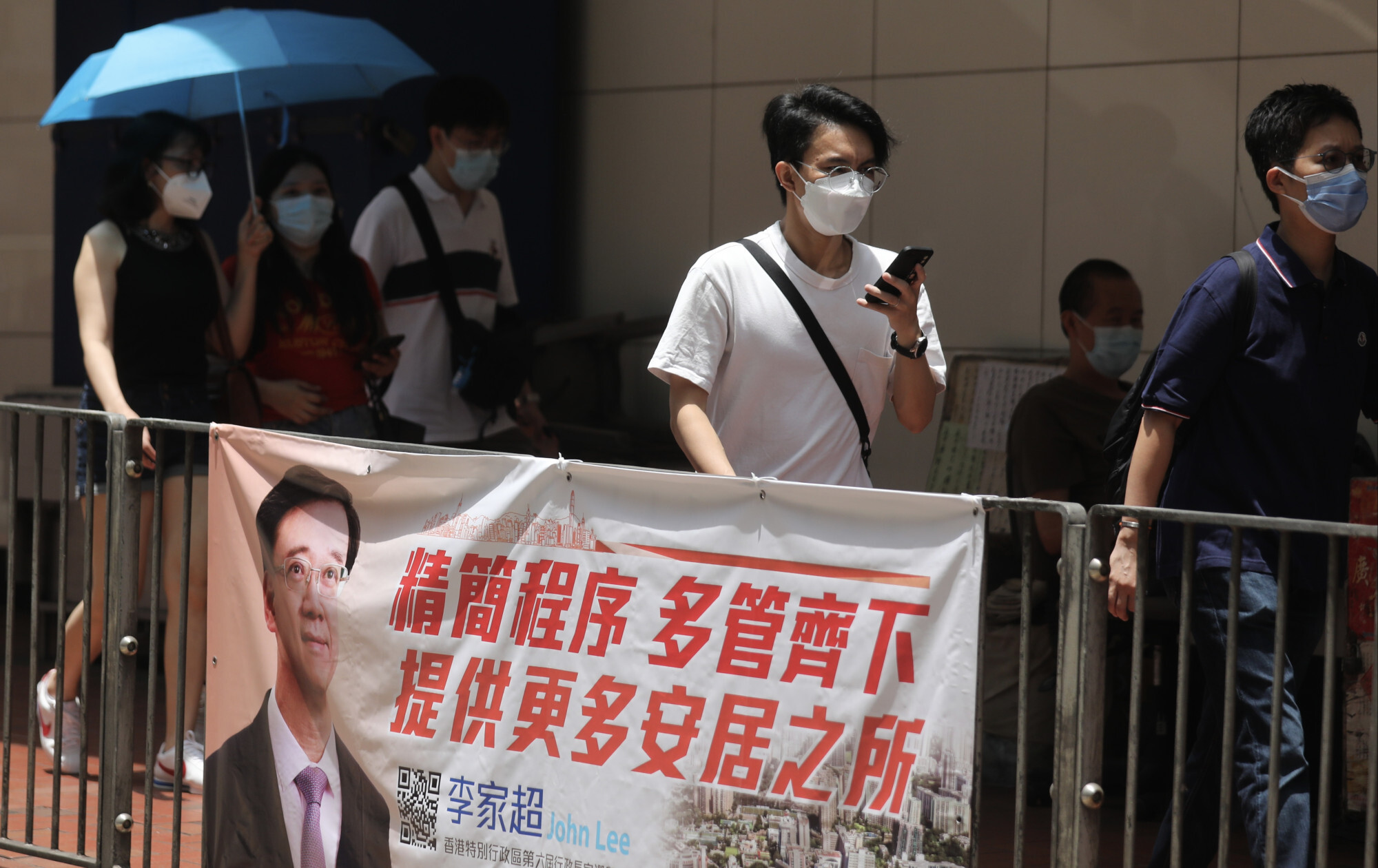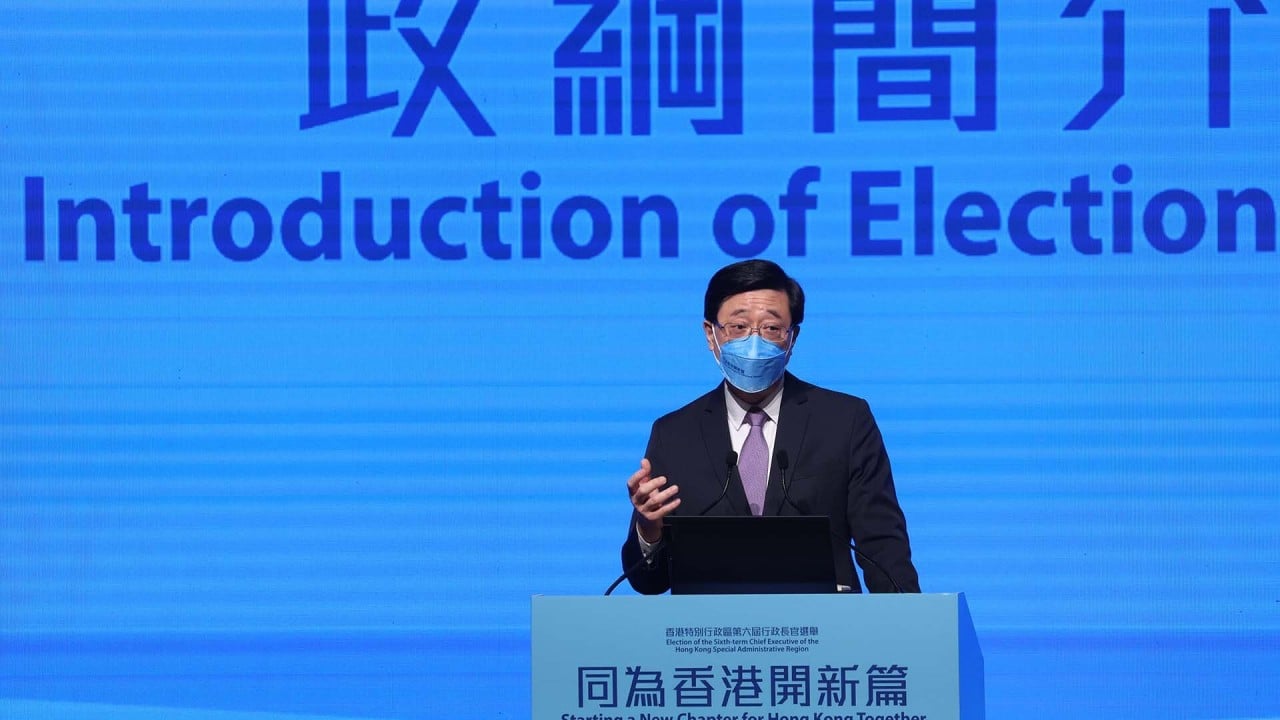
So brief, so vague, so late: how Hong Kong chief executive candidate John Lee’s election manifesto differs from past candidates’ approaches
- Condensed campaign period to blame, some say, and being vague allows Lee ‘flexibility with policies’
- Lack of details makes it hard to assess if he does well in office, say critics who expected more
When Hong Kong’s sole chief executive candidate John Lee Ka-chiu delivered his election manifesto on Friday, it struck many as being vague about his plans, short on details, hard numbers or dollar estimates.
He unveiled his manifesto three weeks after launching his bid to be city leader, and only nine days before the powerful 1,461-member Election Committee votes on May 8.
All this sets him apart from candidates in Hong Kong’s previous leadership races, who presented their plans much earlier and in far greater detail before they were elected.
Will John Lee’s manifesto ‘open a new chapter’ for Hong Kong?
Pro-Beijing politicians appealed for understanding, pointing out that this year’s delayed election had a much condensed campaign period.
As the sole candidate, and having Beijing’s blessings to run, Lee is expected to win. Some argued that the lack of details gave Lee flexibility to adapt his policies to changing situations.
Others, however, were more critical, saying such an ambiguous manifesto in a one-man show made it hard to evaluate Lee’s performance in office.
“This is a half-baked paper that lacks details envisioning the future of Hong Kong,” said Tik Chi-yuen, the sole non pro-establishment lawmaker. “We expect a city leader to tell us where you are steering us to.”
Lee’s manifesto covers four broad areas: strengthening governance capability, streamlining procedures to tackle housing problems, enhancing overall competitiveness, building a caring and inclusive society and enhancing upward mobility for youth.
He did not pledge extra spending or give financial estimates in any policy areas. A proposal to shorten the queue for public housing by letting applicants move into their flats before the whole estate is built was one of the few concrete policy goals described in some detail.

Conceding that some issues were not covered, Lee said on Friday: “It doesn’t mean we are not concerned about these issues, I will make use of other opportunities to explain my thinking and governance in those regards.”
A comparison with past chief executive elections since the city returned to China in 1997 showed the difference between his approach and that of previous winning candidates.
All presented their plans much earlier. First leader Tung Chee-hwa announced his manifesto 77 days before winning his second term unopposed in 2002. His successor, Donald Tsang Yam-kuen, presented his 45 policy directions 52 days before being reelected in 2007.
The next two leaders, Leung Chun-ying and incumbent Carrie Lam Cheng Yuet-ngor, unveiled their full platforms 19 and 27 days before the elections in 2012 and 2017 respectively.
All the previous candidates also presented much more detailed manifestos.
In 2017, Lam presented her plans in two phases. On February 13, she announced her vision for housing, education and tax reform, saying it was meant for Election Committee members to understand her personality.
She followed up on February 27, unveiling a 52-page document that proposed an annual HK$5 billion (US$637.2 million) boost of recurrent expenditure on education, introducing a two-tier profits tax system to reduce the tax burden on enterprises, and allowing the 250,000 Home Ownership Scheme owners to put up their flats for rent through social enterprises without having to pay land premiums.
In 2012, Leung pledged to spend HK$4.5 billion in his first year in office, including HK$3.2 billion on a means-tested old age allowance, HK$1 billion for government-funded universities and HK$300 million on medical vouchers for the elderly. He also promised more investment in education, health and the civil service, though he was short on financial details.
What we know so far about John Lee’s vision for Hong Kong
When Tsang launched his campaign to seek re-election in 2005, he went to great lengths pledging to defend Hong Kong’s core values such as freedom and equality, and rebuild mutual trust with Beijing. On separate occasions before the election, he spelt out his platform to the 800 Election Committee members and ordinary residents.
Tung began his 2002 re-election bid saying he did not need a manifesto as Hongkongers knew where he stood on issues from his policy addresses during his first term. A month into his campaign however, he issued an election platform after coming under fire from the opposition.
Tung also held four question and answer sessions with Election Committee members.
Hong Kong’s John Lee reveals plans for city over next 5 years, with focus on housing
Asked about the stark differences in Lee’s approach this year, political commentator Lau Siu-kai, from the semi-official Chinese Association of Hong Kong and Macau Studies think tank, said he believed Lee chose vagueness over clarity to give himself flexibility in adjusting policies after taking office.
“This can prevent people from criticising him for making empty promises, and undermining the credibility of his administration,” he said. “His strategy allows him to execute measures better tailored to new circumstances.”
Business and Professionals Alliance for Hong Kong lawmaker Priscilla Leung Mei-fun said although Lee’s manifesto was brief, it highlighted “the pain points” of the outgoing administration.
But Chinese University political scientist Ivan Choy Chi-keung said: “With so few details on policies in his platform, it will be very hard for the public to scrutinise and monitor whether Lee does good work in future.”
He added that Lee was able to be so vague because he had no competitors who would have piled pressure on him in public debates.
Where were the bigwigs at manifesto event for Hong Kong’s John Lee?
Political commentator Jason Poon Cheuk-hung, an unsuccessful independent candidate in the recent Legislative Council elections, also expressed disappointment, saying Lee failed to meet the expectations of many who anticipated a comprehensive, convincing manifesto.
“Lack of preparation time and resources are not excuses when he is going to be our next chief executive from July. Hong Kong will not stop for a few months to await his policy [announcements],” he said.
Additional reporting by Chris Lau and Lilian Cheng


